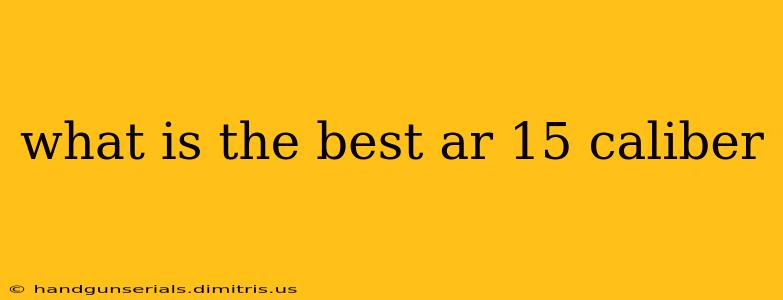What's the Best AR-15 Caliber? It Depends on Your Needs
The question of the "best" AR-15 caliber is a classic firearms debate, with no single right answer. The ideal choice hinges entirely on your intended use – whether that's home defense, hunting, competition, or recreational shooting. Each caliber presents a unique blend of advantages and disadvantages. Let's explore some of the most popular options and break down their strengths and weaknesses to help you make an informed decision.
Popular AR-15 Calibers and Their Applications:
5.56 NATO (.223 Remington):
-
Pros: This is the quintessential AR-15 cartridge, renowned for its light recoil, high velocity, and relatively flat trajectory. It's widely available, affordable, and boasts a vast selection of ammunition types (ball, hollow point, tracer, etc.). Its manageable recoil makes it excellent for beginners and extended shooting sessions. Furthermore, it offers decent effectiveness at moderate ranges.
-
Cons: While effective, its relatively lightweight bullet can experience significant energy loss at longer ranges, limiting its suitability for hunting larger game. It also has a reputation for potentially over-penetrating in close-quarters situations.
-
Best for: Home defense (though careful consideration of overpenetration is crucial), target shooting, and tactical training.
.300 Blackout:
-
Pros: This cartridge offers substantially more stopping power than 5.56 NATO, making it a compelling choice for home defense and hunting medium-sized game. Its subsonic capabilities allow for quieter operation with a suppressor. It also exhibits less recoil than heavier calibers.
-
Cons: Ammunition can be slightly more expensive than 5.56 NATO, and its selection is less extensive. Its shorter range compared to 5.56 NATO limits its versatility.
-
Best for: Home defense, hunting (deer-sized game), and suppressed shooting.
.223 Wylde:
-
Pros: This chambering is designed to handle both .223 Remington and 5.56 NATO ammunition reliably, providing increased flexibility. It offers slightly improved accuracy and longevity compared to a standard .223 Remington chamber.
-
Cons: While offering advantages, the benefits are marginal for many shooters, and the cost may be slightly higher due to the less common chambering.
-
Best for: Shooters who want the versatility of using both .223 and 5.56 ammunition without compromising accuracy or barrel life.
6.5 Grendel:
-
Pros: This cartridge delivers exceptional accuracy and ballistic performance at longer ranges than 5.56 NATO. Its heavier bullet retains energy better, making it an excellent choice for hunting larger game.
-
Cons: Ammunition can be more expensive than 5.56 NATO or .300 Blackout, and recoil is noticeably higher. Magazine compatibility may be limited compared to more common calibers.
-
Best for: Long-range precision shooting, hunting larger game (deer and up), and competitive shooting.
6.8 SPC:
-
Pros: This cartridge strikes a balance between 5.56 NATO’s light recoil and the heavier-hitting .300 Blackout. It offers improved stopping power compared to 5.56 NATO with manageable recoil.
-
Cons: Ammunition selection may be less diverse than other calibers. Its performance at longer ranges is somewhat less impressive than the 6.5 Grendel.
-
Best for: Home defense, hunting medium-sized game, and situations requiring more stopping power than 5.56 NATO.
Choosing the Right Caliber: Consider Your Priorities
Ultimately, the "best" AR-15 caliber depends heavily on your intended use and personal preferences. Before making your decision, carefully consider:
- Intended Use: Home defense, hunting, target shooting, competition, etc.
- Range: Will you primarily be shooting at close, medium, or long ranges?
- Budget: Ammunition costs vary significantly between calibers.
- Recoil Sensitivity: Higher-caliber rounds generally have more recoil.
- Ammunition Availability: Ensure your chosen caliber is readily available in your area.
By carefully weighing these factors, you can choose an AR-15 caliber that perfectly meets your needs and enhances your shooting experience. Remember to consult with experienced shooters and firearm professionals for personalized advice.

